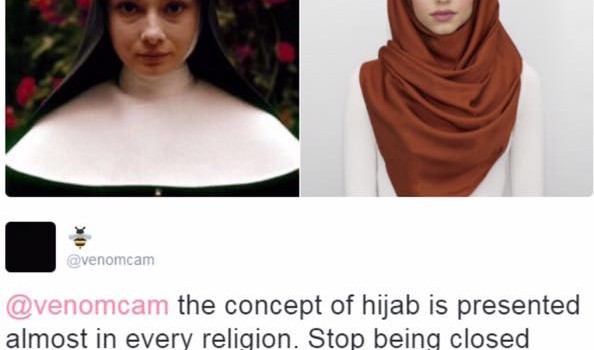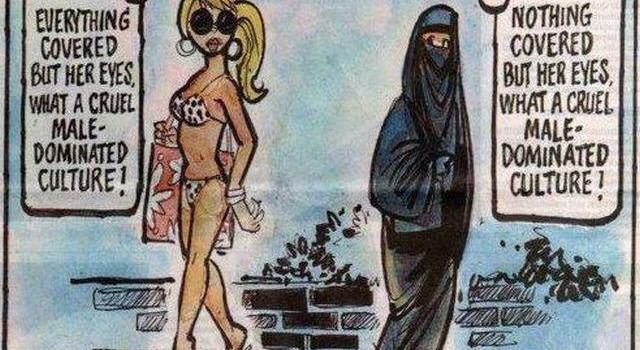In (further) defense of the title ‘What it is like to be a Muslim woman’
I wrote a two-part personal account of my experiences as a Muslim woman, and they are experiences of horror, oppression, suppression, and pain.
I have titled both parts of this “What it is like to be a Muslim woman”.
In both pieces, I stressed that my experience is not presented as representative of Muslim experiences in general. So how, why am I claiming this title? I provided some of my reasoning for it in Part Two, but I want to go back to this, because I think it is an important matter of responsibility for my decision.
And it is very much a decision, to label my accounts of pain, violence, and oppression by this title, “What it is like to be a Muslim woman”, even though anti-Muslim bigotry is a real problem in the West, even though there are plenty of warm, loving, positive, healthy, nurturing Muslim experiences.
It is a delicate decision burdened with responsibility given the social climate of anti-Muslim bigotry, my knowledge and experience, my goals. And I am driven to affirm it, to cleave to this decision, though I’ve been thinking and rethinking this title for months.
I decide to cleave to it because defection from and nonconformism to an Islamic ideal is actively leading to the suppression, stigmatization, delegitimatization and silencing of apostate voices such as mine on the basis of this very claim, that they have no right to claim Muslim experiences. Never mind that Muslim experiences constituted the entirety of our socialization, the actualization and politicization our lives, never mind that we actually grew up and lived in Muslim-majority countries and thus belonged to dominant institutions that were Muslim, a thing Muslims from/in the West cannot claim to have experienced and thus simply do not understand.
It is a decision based on the struggles and incredible suffering I witness my ex-Muslim community in North America going through, many of whom are socially constrained into being closeted. It is based on my heartbreak every day listening to them trying to realize self-determination and escape the stigma of objecting to Islam. It is based on the invisibility of that struggle.
It is response to stories like mine being objected to time and again on the grounds that whatever motivations were at play in our oppression, they were not supported, influenced, or backed by Muslim ideals (let alone institutionalized mechanisms of religious oppression) at all and are just crazy anomalies or the results of the personal decisions of individual bad people.
It is in response to ‘Muslim’ or ‘Islam’ being treated as if it means one thing instead of thousands upon thousands of them, without focus on individual experience, on the individuation and multiplicity of its people and beliefs.
It is in response to the idea in somebody’s head that ‘Muslim’ means one thing that causes them to object to my calling my experience that of a Muslim woman.
Because I want to destroy that idea. Because that is the idea that leads to progressive and LGBTQ Muslims not being considered ‘true’ Muslims and their wonderful efforts denounced and discounted. Because it is the idea that allows people to ignore the manner and degree of religious influence in the oppression of people affected by Muslim people, countries, and social and legal institutions by calling it something else than ‘Muslim’.
It is in response to what I consider to be some misguided claims in the West that the most important or only real Muslim problem worth focusing on are matters of national security and terrorism rather than the treatment of Muslim women in Muslim theocracies. It is with deliberate intent to put the focus on Muslim women before putting it on white people or Westerners.
It is in short, a response to my assessment of which problems are most prevalent and weighty in the discussion of Islam by both its defenders and critiquers. Thus I will repeat my affirmation:
I insist on this title because of individuation—Muslims are separate, distinct, with individual characteristics, and they are not a brand–and individualism—because recognizing and esteeming personhood is paramount to any discussion of human experiences and human rights. Because of a refusal to use identity markers as excuses to lump people into fixed groups rather than considering identity markers to belong to individuals who reclaim them and revalue them in critical, honest ways.
When ‘Islam’ is not a monolith in practice, belief, or interpretation, when it is a disservice to real, organic human beings to treat it as such, when ‘Muslim’ can be an identity as widely varying as the faces of the women that carry it, as the beliefs of these women—then any and all of their stories are stories of what it is like to be a Muslim woman.
Because their religion and their culture belongs to them individually, and not vice versa.
I say again, because cultures belong to people, not people to cultures.
My story is always the story of what it is like to be a Muslim woman. And there is always another story, and it is always important.”
And while I realize there may be further considerations and objections to my decisions and approach, I don’t mean to be flippant in saying it’s likely I’ve already thought about them and deeply considered them, because this project is probably the most important thing to my values and my life’s work.
And it’s a complex subject, a delicate one, probably one with no ‘right’ answers but better or worse ones based on what we know, what we try to achieve, how much we can help vs how much we can hurt– and I’m on the inside of so much that is so complex and difficult. Part Two of ‘What it is like…’ is the work of months of deliberation on technique and approach and benefit vs detriment. I understand the reasons for reservations, the manners in which this is problematic–but I cleave to my decision to claim this title, because that is how my considerations have evened out, and I deeply believe in responsible, measured thought.
Relevant links to rhetorical approach in discussing Islam:
Four mistakes you make when you talk about Islam:
http://aveilandadarkplace.com/…/4-mistakes-you-make…/
How can we discuss Islam in better ways?:
http://aveilandadarkplace.com/…/how-can-we-discuss…/
Much love
-Marwa



